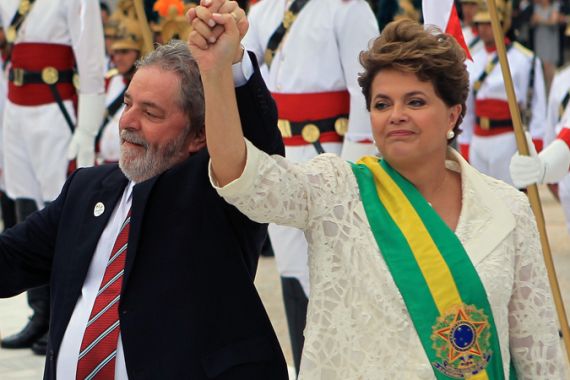Rousseff takes the reins in Brazil
Rising inflation and infrastructure issues among challenges for Lula da Silva’s successor.

Dilma Rousseff has been sworn in as Brazil’s first female president, succeeding her hugely popular predecessor and mentor Luiz Inacio Lula da Silva.
Rousseff, 63, who served as Lula’s former cabinet chief, assumed the presidency on Saturday at Brazil’s congress after a short motorcade ride under steady rain in the capital Brasilia, during which she waved to a crowd of an estimated 70,000 supporters.
In her first speech to the nation as president, delivered after taking the presidential oath and signing official documents, Rousseff swore to protect the most vulnerable in Brazil and to “govern for all”.
She repeatedly paid homage to Lula, saying she had been honoured to serve under “the great man” and pledged to maintain his achievements, notably in reducing poverty and promoting economic prosperity.
“The most determined struggle will be to eradicate extreme poverty,” she said, declaring: “We can be a more developed and fairer country.”
Plans outlined
Rousseff outlined plans for tax overhaul, environmental protection, improved health services and regional development.
She also said she would take measures to combat foreign “speculation” that could threaten to upset Brazil’s economic growth.
Al Jazeera’s Gabriel Alizondo, reporting from Brasilia, said one of the surprising aspects of Rousseff’s speech was the homage she paid to people who had been jailed or tortured under military rule in the 1970s.
“This was a little bit of a surprise … because [although] she was a victim – she was in jail for three years under the military dictatorship – this was something that she has never really spoken about during the campaign or in the public,” he said.
After the speech, Rousseff was to see Lula at the presidential palace, where he was to give her the green-and-gold presidential sash and Latin American presidents were to welcome her.
Lula, who was required to step down after serving the maximum two consecutive terms permitted under Brazil’s constitution, threw his formidable popularity and charisma into getting Rousseff elected as his successor.
Rousseff takes over a country with an economic growth rate of 7.6 per cent in 2010, and recently discovered oil fields that could make it a large exporter of the commodity.
Under Lula, Brazil also took on a significant role on the world stage.
Challenges await
While the current situation holds much promise, Rousseff will be mindful that there are also challenges ahead.
Growth is expected to slide to 4.5 per cent in 2011, inflation is at 5.9 per cent [well above the government target] and rising, and plans to cut public debt from 42 to 30 per cent are likely to meet stiff resistance.
The country remains in dire need of more, and better, infrastructure, and while its currency has strengthened under Lula, this has made its manufactured exports less competitive in the global market.
Rousseff, a leftwing former guerrilla, will also inherit a diplomatic row with Italy.
On his last day in power, Friday, Lula sparked the spat by refusing to extradite Cesare Battisti, an Italian political radical convicted of four murders in the 1970s.
Italy withdrew its ambassador in protest and said it would raise pressure to have Battisti handed over.